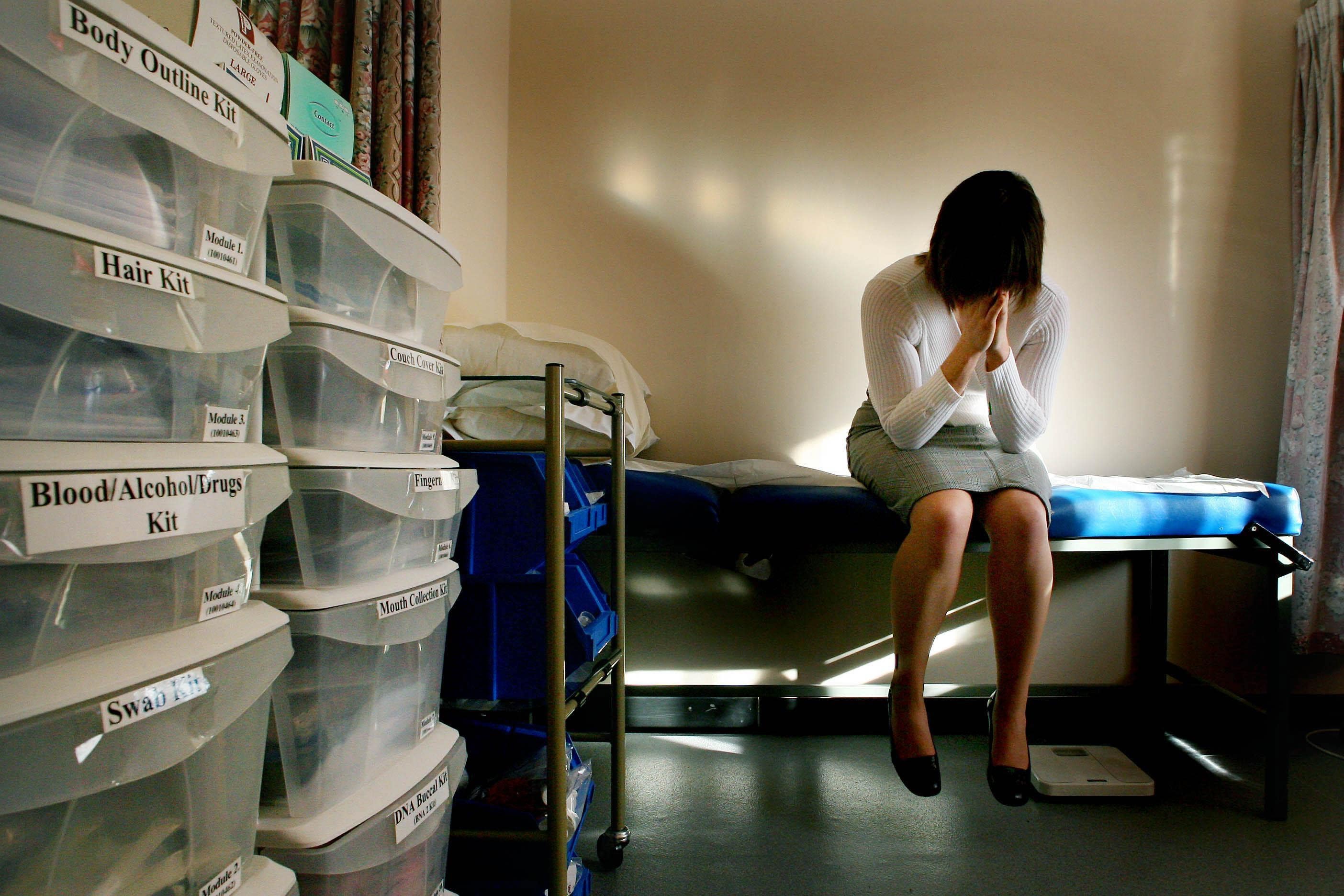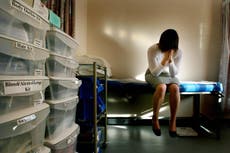I was raped and didn’t report it – though I wish I had. This is why
Five in six women who are raped don’t tell the police. I am one of them

I am not the perfect rape victim. I was raped by my Hinge date who I invited into my house to watch a film the first time we met. If the perfect rape victim did exist (they don’t) and I was her, then I suppose I would have been out walking my elderly neighbour’s dog at 1pm on a pleasant autumnal afternoon, in a busy suburban area on a route I knew well that passed by a police station; wearing baggy trousers, long sleeves and flat shoes; and I wouldn’t have had a drink since that glass of Baileys last Christmas.
I am not her. In fact, in the days leading up to my rape, I exchanged flirty text messages with my rapist. I went out that evening to meet him, dressed in a way I felt might interest him, hoping for a mutual spark. I found him attractive, I wanted to kiss him and told him as much, I even wanted him to touch me. Until I didn’t. Until the look on his face and the intent behind his actions changed; until what he was doing became aggressive and violent and I wanted him to stop. Until I told him to stop and he did not stop.
The next morning, as the reality of what had happened to me dawned along with the new day, I googled what I should do, then contacted my local Sexual Assault Referral Clinic (SARC), The Bridgeway, who told me I could go in for a forensic examination and support, with no pressure whatsoever to report what had happened to me to the police. I remember that this reassurance felt vital to me.
From the moment I realised that a crime had been committed against me and I was injured, I was frightened of the idea of police officers; of statements; of providing proof; of being 100 per cent accurate about what had happened when I could barely recollect where I was or when he left, all those hours later.
I did what the SARC telephone advisor told me to do and I put the clothes and knickers I had been wearing the night before into a bag. I was shaking so much that I couldn’t get the items of clothing in even after several attempts. “Have you showered?” she asked me. I hadn’t. “That’s good”, she said, “gives us more chance of getting something for the samples.”
I entered the SARC that morning unwashed and clutching my plastic bag full of the clothes another version of me used to wear. The treatment I received from the staff was incredible. From beginning to end I was treated with kindness, compassion, support and – crucially – I was treated like somebody who was believed. They believed me just as much when I was in the initial consultation room telling them what had happened, as they did when they photographed the emerging echoes of the deep, dark bruises that were beginning to bloom on my neck, arms and legs.
Yet, even as the nurses took the swabs and photographic evidence from my body, I felt the sinking weight of knowing that I, like most victims of rape and sexual assault, would find it almost impossible to prove my rape beyond all reasonable doubt in a court of law. There were no witnesses. It would be my word against his, and a victim’s word is so often not enough.
The statistics back this sinking feeling up. In 2022 less than 2 in 100 rapes recorded by police resulted in a charge. And that’s only a charge – not even a conviction. The Bridgeway staff explained my options for police involvement to me clearly, but I knew that if I chose to pursue a prosecution, I, like so many women, would be entering into a devastating struggle with a legal system that fails victims systematically. And it would be a struggle that could last for many years, threatening my recovery and privacy as well as the future wellbeing of myself and my children. A “choice” of action isn’t really that if one of the options feels insurmountable.
Of course it shouldn’t be this way. Survivors enduring the aftermath of rape and sexual assault should not be facing such darkly hopeless statistics and realities, and whatever reforms are being tried and tested are not enough to combat the state we are in.
It was no surprise to hear that a new programme – piloted by 19 police forces, and soon to be expanded to all 43 police areas across England and Wales – falls a long way short of what is needed. Operation Soteria aims to “change the ways police forces and the Crown Prosecution Service (CPS) respond to rape and sexual assault cases”. But women who have reported being raped – even in these pilot areas – say that the police and court systems are still “weighted in favour of the accused”, and the process victims are required to go through is still discouragingly “tough”.
The latest available official figures show between April and December 2022 – that’s only nine months, not even a full year – there were about 50,000 rape offences recorded by police in England and Wales. The stats from Scotland and Northern Ireland would be in addition to that. Of those 50,000, about 900 (approximately 1.8 per cent) had yet resulted in a charge or court summons.
This should be viewed by everyone as a national crisis. It is hard to think of these statistics getting any worse. If they did, then that would be tantamount to admitting rape was effectively legal in the UK.
The abhorrently low instances of prosecution and conviction in rape cases frightens me, as it should all of us because the problem is not going away. One in four women have been raped or sexually assaulted as an adult, yet five in six women who are raped don’t report it to the police. This number is worryingly huge.
But let me ask you this: if you had the choice to take a test which would take around two to four years of your life to complete; require you to relive past trauma; risk the possibility of intimate parts of your life being made public; and which you only had a 2 per cent chance of passing, would you take it?
For now, my DNA samples are held in a freezer at the SARC I attended, which I find weirdly comforting. In the absence of a suitable judicial process, as a survivor, I take comfort in surprising ways.
My samples will remain there until enough new samples come in that there is no longer sufficient space to keep them, at which point the clinic will contact me to confirm I don’t want to proceed with prosecution as a non-recent rape case, before destroying them.
Knowing this gives me a small sense of power. In fact, in the face of such an inadequate legal system, merely having the option to prosecute sometimes feels more powerful than the process of actually attempting it. But perhaps this isn’t so surprising after all. In the end, having the choice is everything.
Rape Crisis offers support for those affected by rape and sexual abuse. You can call them on 0808 802 9999 in England and Wales, 0808 801 0302 in Scotland, and 0800 0246 991 in Northern Ireland, or visit their website at www.rapecrisis.org.uk. If you are in the US, you can call Rainn on 800-656-HOPE (4673)




Bookmark popover
Removed from bookmarks